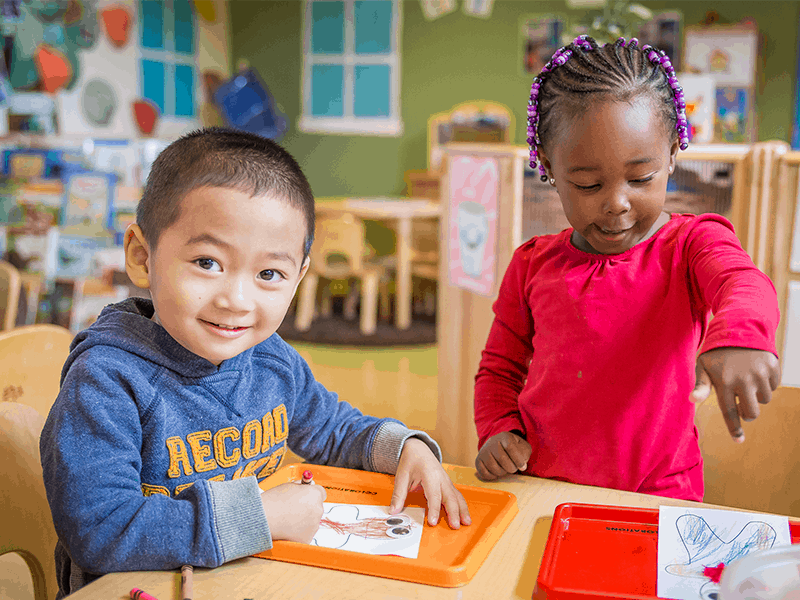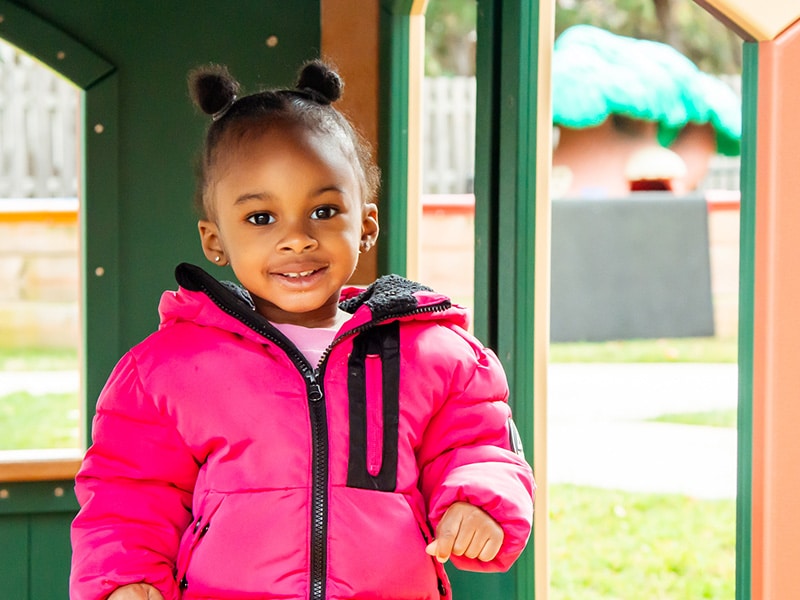Policy changes to Chicago’s school-based pre-K system enabled greater equity in both access to and enrollment in full-day, school-based pre-K, according to a new study by education researchers at NORC at the University of Chicago, Start Early (formerly known as the Ounce of Prevention), and UChicago Consortium on School Research. The study, Closer to Home: More Equitable Pre-K Access and Enrollment in Chicago, analyzes access to (distance and number of classrooms) and enrollment in pre-K from 2010-2016, both before and after policy changes occurred. Post-policy, high-priority student groups were up to three times more likely to enroll in full-day pre-K.
“Shifting where seats were located was a primary lever in the district’s policy strategy,” said Stacy Ehrlich, principal investigator and senior research scientist, NORC. “The concentration of full-day pre-K seats increased most on the West and South Sides of Chicago in neighborhoods where children have historically been under-enrolled in pre-K.”
Beginning in 2013, the City of Chicago launched major policy efforts to create more equitable enrollment in pre-K programs. The policies, including increasing the number of full-day pre-K classrooms and reallocating classrooms throughout the city, aimed to enroll more students from “high-priority” groups to help them better prepare for success in kindergarten and beyond. High-priority groups included students of color, students speaking a language other than English, and students living in neighborhoods with lower income and higher unemployment.
Pre-policy, the students most likely to enroll in the small number of full-day Chicago Public Schools (CPS) pre-K options (many of which required families to pay tuition) were White students, students living in highest-income neighborhoods, and students living in mostly-White neighborhoods. Post-policy, full-day pre-K opportunities expanded, and the students most likely to enroll in full-day pre-K were Black students, students living in lowest-income neighborhoods, and students living in mostly-Black neighborhoods.
“While Chicago significantly expanded enrollment in full-day, school-based pre-K, our study shows that there are still many age-eligible students who are not being served in full-day pre-K,” said Maia Connors, director, Research and Policy Initiatives at Start Early. “For example, the enrollment rate is only about 3 percent for Latinx students, so more work is needed to increase full-day pre-K opportunities for these families.”
“As school districts nationwide grapple with limited budget and capacity to expand full-day pre-K, this study offers an example of how to make evidence-based policy decisions to create more equitable and accessible enrollment opportunities for those students who are most likely to benefit,” said John Q. Easton, senior fellow, UChicago Consortium on School Research and former director of the Institute of Education Sciences, U.S. Department of Education. “The next step in our research will be to examine the relationship between increased pre-K access and enrollment and student outcomes in second and third grade.”
This study demonstrates that increased access was linked to increased enrollment, but access is just one policy lever that districts can use. Chicago implemented other policy changes simultaneously, including: a centralized pre-K application and enrollment process; prioritization of eligibility and placement of students with certain characteristics or experiences (e.g., lowest income); online information about pre-K options and quality; and local outreach efforts with families. “Policymakers may want to explore whether and how similar strategies may be effective in their districts,” said Ehrlich.
Research Questions and Key Findings
Question: Prior to policy changes, what was the association between students’ likelihood of enrollment and 1) their distance to the closest school with any pre-K/full day pre-K, and 2) the number of any pre-K/full-day pre-K classrooms close to their home?
Key Findings
- Pre-policy, enrollment rates in any CPS pre-K were higher for students who lived closer to schools with pre-K and had more pre-K classrooms near where they lived.
- Pre-policy, the associations of likelihood of enrollment in full-day pre-K with 1) distance to a school with a full-day pre-K classroom, and 2) number of full-day pre-k classrooms close to home were strongest for Black students and students living in lowest-income neighborhoods.
- Pre-policy, the students most likely to enroll in full-day pre-K were white students and students living in highest-income neighborhoods.
Question: Post-policy, did access to any pre-K/full-day pre-K change for some or all students?
Key Findings
- For most student groups, distance to a school with any CPS pre-K did not change substantially, and the number of pre-K classrooms available went down slightly.
- In contrast to any pre-K, access to full-day pre-K increased following policy changes for nearly all student groups.
- The portion of CPS elementary schools offering full-day pre-K quadrupled, from 10 percent to 41 percent.
- The concentration of full-day pre-K seats increased most on the West and South Sides of Chicago in primarily Black neighborhoods and neighborhoods with lower income.
Question: Post-policy, when access changed, did enrollment change in corresponding ways?
- Full-day pre-K enrollment rates grew nearly four-fold from 3.2 percent in 2010-2011 to 11.6 percent in 2015-2016.
- Black students and students living in lowest-income neighborhoods were three times more likely to enroll in full-day pre-K following policy changes.
- Latinx students were also more likely to enroll in full-day pre-K following policy changes, but at rates much lower than the city average (2.6 percent for Latinx students compared to 7.2 percent for all students).
Question: Following the policy shift, was access still related to enrollment in the same direction and with the same magnitude as it had been before?
Key Finding
- Post-policy, access continued to predict enrollment in full-day pre-K. However, the association became stronger for Black students, lowest-income students, and for students living in mostly Black neighborhoods.
Cite as: Ehrlich, S.B., Connors, M.C., Stein, A.G., Francis, J., Easton, J.Q., Kabourek, S.E., & Farrar, I.C. (2020). Closer to home: More equitable pre-k access and enrollment in Chicago (Research Snapshot). Chicago, IL: University of Chicago Consortium on School Research, NORC at the University of Chicago, and Start Early.
About NORC at the University of Chicago
NORC at the University of Chicago is an objective, non-partisan research institution that delivers reliable data and rigorous analysis to guide critical programmatic, business, and policy decisions. Since 1941, NORC has conducted groundbreaking studies, created and applied innovative methods and tools, and advanced principles of scientific integrity and collaboration. Today, government, corporate, and nonprofit clients around the world partner with NORC to transform increasingly complex information into useful knowledge.
About Start Early
Start Early (formerly known as the Ounce of Prevention) is a nonprofit public-private partnership advancing quality early learning and care for families with children, before birth through their earliest years, to help close the opportunity gap. For nearly 40 years, Start Early has delivered best-in-class doula, home visiting and Early Head Start and Head Start programs. Bringing expertise in program delivery, research and evaluation, professional development and policy and advocacy, Start Early works in partnership with communities and other experts to drive systemic change so that millions more children, families and educators can thrive. Learn more at StartEarly.org.
About the University of Chicago Consortium on School Research
\With the goal of supporting stronger and more equitable educational outcomes for students, the UChicago Consortium conducts research of high technical quality that informs and assesses policy and practice in the Chicago Public Schools. We seek to expand communication among researchers, policymakers, practitioners, families, and communities as we support the search for solutions to the challenges of school improvement. The UChicago Consortium encourages the use of research in policy action and practice but does not advocate for particular policies or programs. Rather, we help to build capacity for school improvement by identifying what matters most for student success, creating critical indicators to chart progress, and conducting theory-driven evaluation to identify how programs and policies are working.

 Diana says Patricia has been her main support over the past year. In the months leading up to her birth, they would talk about prenatal care, fetal development and how Diana could best advocate for herself and her child. When Illinois’ stay-at-home order was implemented in March, Patricia continued to support Diana through video chats, phone calls and text messages.
Diana says Patricia has been her main support over the past year. In the months leading up to her birth, they would talk about prenatal care, fetal development and how Diana could best advocate for herself and her child. When Illinois’ stay-at-home order was implemented in March, Patricia continued to support Diana through video chats, phone calls and text messages. To Diana, early learning and care is important because there isn’t a parenting manual and like every parent, she wants what is best for her son. She knows the resources and supports she’s received from her doula and home visitors are laying the foundation for her son’s future success.
To Diana, early learning and care is important because there isn’t a parenting manual and like every parent, she wants what is best for her son. She knows the resources and supports she’s received from her doula and home visitors are laying the foundation for her son’s future success.





